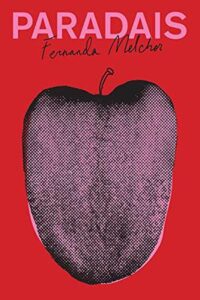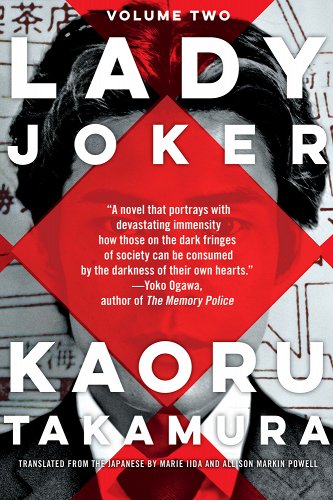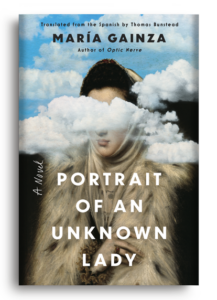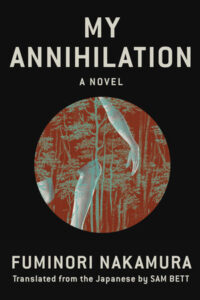It’s rare enough for stories to go from ideas to published works, let alone garner enough attention to get translated, but these books have all made that long journey to be with English-speaking readers today, which is why we try to draw special attention to crime fiction in translation here on the site. Each of these works offers insight into other cultures. These are not niche reads, however, consumed for tourism rather than literary merit—these are proper opuses, likely to stand the test of time and (hopefully) multiple adaptations. 2022 was a particularly excellent year for works translated from Spanish (Mexico and Argentina) and Japanese, with books from South Korea and Italy also appearing in the top list, and notables from across the world. (I’m sorry for not reading more Scandinavian thrillers this year, y’all!)

Fernanda Melchor, Paradais
Translated by Sophie Hughes
(New Directions)
Fernanda Melchor’s Paradais is brutal poetry, distilled. It’s also a visceral examination of classism, fatphobia, and most of all misogyny. In a luxury apartment complex, two boys on the cusp of manhood while away a long summer drinking together. Franco Andrade, a resident of the complex who lives with his grandparents but is ostracized by the rest of the community, is overweight, undersocialized, and sexually obsessed with his neighbor; he steals liquor from his family and shares it with Polo, the teenage gardener of the complex, who yearns to join the cartels and make something of himself instead of wasting his youth trimming grass for rich people. Franco has a fantasy that becomes more and more like a plan: he’s going to break into his neighbor’s home and force himself on the object of his desires. Polo’s pissed off, drunk, and just angry enough to help Franco out. Like other works out this summer, including Liska Jacobs’ brilliant The Pink Hotel, Paradais warns against considering any luxurious abode as “safe” when the mere existence of such enclaves intensifies the inequalities that will eventually lead to their own demise.

Gu Byeong-Mo, The Old Woman With the Knife
Translated by Chi-Young Kim
(Hanover Square Press)
The Only Murders in the Building, Deanna Raybourn’s Killers of Certain Age, and Gu Byeong-Mo’s The Old Woman in the Knife — together, these stories herald a new era in the portrayal of aging sleuths who have the skills and wisdom of decades of experience. In The Old Woman and the Knife, a 65-year-old assassin who’s been committing murder for hire for 40 years grapples with whether or not to retire, as lingering injuries, internal competition, and new friendships threaten to imperil her career.

Riku Onda, Fish Swimming in Dappled Sunlight
Translated by Alison Watts
(Bitter Lemon Press)
Riku Onda’s novel The Aosawa Murders established the author as a major international talent, and now Fish Swimming in Dappled Sunlight cements that reputation with one of the twistiest psychological thrillers of the year. There are two alternating narrators in this novel. We meet them as they are about to move out of a shared apartment, preparing to hash things out before parting ways forever. The two narrators—roommates? lovers? family?—went on a disastrous trip the year before, and now they are finally ready to look back on their hike in the mountains and compare memories to figure out what exactly happened, and who to blame for the way things went down. Riku Onda is astonishingly good at the gradual reveal, and the dollops of information she doles out are sure to keep you turning the pages (but slowly, so you don’t miss anything).

Kaoru Takamura, Lady Joker, Vol. 2
Translated by Marie Iida and Allison Markin Powell
(Soho)
One of the more ambitious crime fictions in recent years came to a conclusion this year with the second volume of its English translation. A kaleidoscopic vision of crime and corruption in modern Japan, Lady Joker is a reimagining of the unsolved Glico-Morinaga kidnapping, but told with such bravado, such scope, that it ends up being a story of a nation. Takamura exposes the syndicates and corporations, the local operators and national politicians, all without losing an eye on the devastating impact felt by the victims and even passing bystanders. Lady Joker is a literary achievement and an utterly gripping, page-turning thriller. –DM

Seishi Yokomizo, Death on Gokumon Island
Translated by Louise Heal Kawai
(Pushkin Vertigo)
Seishi Yokomizo was the king of the locked-room mystery, and there’s nothing more cut off than an island. In Death on Gokumon Island, Yokomizo’s ode to And Then There Were None, a weathy family’s scion dies while returning home after the war, and his sisters are declared next to be in danger by a mysterious letter. As tensions rise between rich and poor, mainlander and islander, so to rises the body count.

Erika Kobayashi, Trinity, Trinity, Trinity
Translated by Brian Bergstrom
(Astra House)
Three generations of women experience an alternate reality 2020 Tokyo Olympics in this fascinating and difficult to describe speculative thriller. Elderly people in Japan are being possessed by the essence of radiation, which has a personality and is quite pissed off.

Maria Gainza, Portrait of an Unknown Lady
Translated by Thomas Bunstead
(Catapult)
In this lavish tale of art and forgery, set in mid-century Buenos Aires, we follow an enigmatic art authenticator who specializes in copying mid-price works and passing them off as originals, and her bored prodigy, who works to solve the mystery of the authenticator’s life. Interspersed are tidbits about the forgery ring’s greatest muse, an aristocratic portrait painter who is easy to copy yet hard to decipher.

Fuminori Nakamura, My Annihilation
Translated by Sam Bett
(Soho)
I read this one on the plane ride down to Texas from NYC. Maybe it was just the creeping doom of Omicron, and maybe it was the way that the guy next to me seemed to creep himself out reading over my shoulder, but My Annihilation is one hell of a ride. From the first sentence—“Turn this page, and you may forfeit your entire life”—Nakamura plays tricks on the reader, the narrator, and even the notion of existence itself. Perfect for those who like their noir obsessive and deeply philosophical.

Olivier Guez, The Disappearance of Josef Mengele
tr. Georgia de Chamberet
(Verso)
As Olivier Guez’s brilliant historical novel begins, the despicable doctor Mengele is living in Argentina, where he’s been welcomed by Peròn, who keeps a contingent of Nazis close by and has allowed in many of the worst war criminals of history into his nation. Mengele finds success in his new home and respect from his equally horrible peers, and spends the first 15 years or so sleeping with escorts, selling his father’s farm equipment, and giving the daughters of the elite illegal abortions on the side. After the capture of Eichman, Mengele becomes obsessed with the specter of Israeli pursuit, yet Guez does a wonderful job at capturing the mindset of a hunted Nazi who’s still utterly convinced that he’s done nothing wrong, despite the occasional nightmare in his sleep that says otherwise.
Most have made Mengele into a complete monster, but Guez does something much more interesting: he takes the monster and shows him as pathetic, disgusting, declining, and weak—exactly as Nazis and their ilk should be portrayed. When you depict someone as classically monstrous, you risk inspiring others to follow in their footsteps for the notoriety alone, but when you find the most squabbling, pathetic, petty parts of a villain to highlight, you can perhaps help to ensure that no one will seek to emulate them.

Concita de Gregorio, The Missing Word
Translated by Clarissa Botsford
(Europa)
“Looking back, I think that in this story everyone has always behaved with the best intentions: even when their actions were incomprehensible and vicious, their intention at the time was always to make things better. Isn’t that awful?”
Here is the story of The Missing Word: a woman and her husband part ways. Her ex takes the children. The children never return, disappeared forever, and the ex commits suicide. Based on real case, the novel explores the spaces that only fiction can fill out from the horrors of fact. Gorgeously written and utterly devastating.
Notables:
Rodrigo Blanco Calderón,tr. Daniel Hahn and Noel Hernández González, The Night (Seven Stories Press) · Silje Ulstein,tr. Alison McCullough Reptile Memoirs (Grove) · Deon Meyer, tr. K.L. Seegers, The Dark Flood (Atlantic Monthly Press) · In Koli Jean Bofane, tr. Bill Johnston, Casablanca Story (Indiana University Press) · Camila Sosa Villada, tr. Kit Maude, Bad Girls (Other Press) · Keigo Higashino,tr. Giles Murray, A Death in Tokyo (Minotaur) · Johanne Lykke Holm, tr. Saskia Vogel, Strega (Riverhead) · J. M. Lee, tr. An Seon Jae, Broken Summer (Amazon Crossing) · Nicolas Ferraro, tr. Mallory N. Craig-Kuhn, Cruz (Soho) · Ragnar Jónasson, tr. Victoria Cribb, Outside (Minotaur)




















